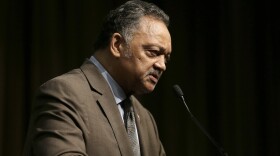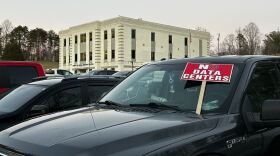After months of negotiations between House and Senate Republicans, the legislature finally released its budget agreement on Wednesday afternoon.
The budget includes a 4% raise for most state employees this year and a 3% raise next year, as well as a gradual decrease in the personal income tax rate.
"This two-year budget carefully considers our state’s past successes, our current needs, and the financial resources we have at our disposal,” Senate leader Phil Berger said in a news release. “It will make infrastructure in rural North Carolina more robust, return over a billion dollars to taxpayers hamstrung by failing Bidenomics, and put student outcomes and parental choice ahead of bureaucracy.”
Democrats like Rep. Deb Butler said they're unhappy with the quick timeline to understand what’s in the bill, which is full of policy provisions.
"It leaves very little time to cover a $30 billion budget and 600 pages," she said.
Final votes will take place in a rare midnight session in the House in the wee hours of Friday and later Friday morning in the Senate, sending the measure to Gov. Roy Cooper, who has said he’ll consider a veto, citing concerns about tax cuts and a major expansion of private school vouchers.
Butler echoed those concerns Wednesday.
"There's a multitude of sins in it, all you need to do is ask a teacher or a state employee or a retiree, or perhaps a taxpayer who is going to now pay for a rich family's private education for their children," she said, arguing that the raises aren't enough and referencing the elimination of income requirements for vouchers.
"There's tax cuts that aren't necessary that are going to create shortfalls for us in the very near future," Butler added.
There's a whole lot more in the 625-page bill, including:
Transportation taxes and fees: The budget includes a new tax on ride sharing services like Uber and Lyft, and it would increase registration fees for hybrid and electric vehicles.
“If someone has an electric vehicle, they're not paying that gas tax,” Moore said. “And so the issue was, how do we ensure that those who were using the roads driving like everyone else, who aren't paying the gas tax, pay their fair share to maintain those roads?”
Water and sewer upgrades: Dozens of counties and towns would get grants totaling nearly $2 billion to fix aging water and sewer systems.
"Folks don't talk about water systems being maintained until the water system fails," Moore said. "Well, we need to make sure that we are putting the resources into when it comes to making sure that we are investing in these infrastructure."
Highway queen: A section of Interstate 40 near Hickory would be named after former Labor Commission Cherie Berry, who was known as the “elevator queen” for her photo on inspection placards.
An independent SBI: The State Bureau of Investigation would no longer be housed within the governor's administration, an apparent response to legislators' allegations that the governor was meddling in SBI hiring and other agency affairs.
Cashing in on lobbyists: Registration fees for lobbyists would increase, and they’d get the opportunity to pay up to $2,000 to get a pass to bypass the legislature’s security checkpoints.
Destroy your own records: Legislators and others in charge of records at the General Assembly would get the power to decide which documents in their office are considered public records—and which ones can be destroyed.
It’s a change that worries open government advocates, but Senate leader Phil Berger says it stems from confusion between the legislature and the Department of Natural and Cultural Resources, which oversees the state’s archives and is housed in the governor’s administration.
Cheaper breast milk pumps: Sales tax would no longer apply to purchases of breast pumps and related equipment.
Voter education: The State Board of Elections would get $2.7 million to implement voter ID, including an awareness campaign to ensure voters know they’ll need to bring a photo ID.
State-funded bodyguards: A provision would give the lieutenant governor a four-officer security detail—but only until gubernatorial candidate Mark Robinson leaves that office at the end of 2024.
Statue on the move: North Carolina has two statues in the U.S. Capitol and it’s in the process of replacing one of former Gov. Charles Aycock with one of evangelist Billy Graham. The budget calls for the Aycock statue to be moved to a state historic site at the governor’s birthplace.
Older judges: The mandatory retirement age for appellate court judges would increase from 72 to 76, which is good news for N.C. Supreme Court Chief Justice Paul Newby, a Republican who is nearing retirement age.
Fewer car inspections: Drivers would no longer need to get annual emission inspections in urban counties, with the exception of Mecklenburg. And even there, drivers would only need one if the car is a 2017 model year or older.
Appreciate your farmers: There's $250,000 to the N.C. Grange to host a "Farmer’s Appreciation Day."







